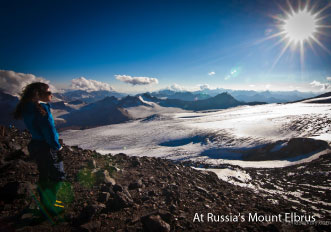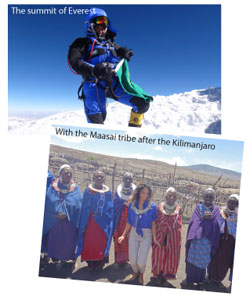Raha Moharrak is literally on top of the world. Having scaled the highest mountain peaks in the world, she tells us what motivates her to achieve greater heights.
Ever since she conquered Mount Everest in May this year, 27-year-old Raha has had the world at her feet. She has since hiked the Inca trail in Peru, climbed the Machu Picchu and scaled Australia’s highest mountain, Mount Kosciuszko.
Raha also fired the starting pistol at the Dubai Women’s Run and was a keynote speaker for the IOC World Conference in Sochi, Russia. In addition to climbing and training, the freelance graphic designer has recently started designing both furniture and high-end outdoor gear for women.
As a child, Raha was the most “abnormally hyper” of three siblings, who was always thrown into sports — be it equestrian, ballet or scuba diving — just so that she’d tire out and go to sleep. But when she told her family about her mountaineering aspirations, it was more than they’d bargained for.
Raha persevered, and currently, she has focussed her energy on climbing The Seven Summits, the highest mountain peaks on each continent.
Woman This Month (WTM): How does it feel to be the youngest Arab woman to climb the Everest?
Raha Moharrak (RM): People have asked me that, but honestly, even if I were the 100th Arab, it would be special to me. When I set out on that expedition, I didn’t set out to create records. I was just living my dream. The records happened inadvertently.
WTM: How did your family react to your mountain climbing decision?
 RM: Well, from my father’s end, it was a big ‘no’ in the beginning. I asked him why and that opened up a dialogue between us. I was in Dubai then, and wrote him three long emails. Before clicking ‘send’, my heart was fluttering. I’d used everything he taught me, against him to argue my case. He ignored me for two long days and finally wrote back, saying, “You’re crazy. I love you. Go for it”. These tiny sentences opened up my life.
RM: Well, from my father’s end, it was a big ‘no’ in the beginning. I asked him why and that opened up a dialogue between us. I was in Dubai then, and wrote him three long emails. Before clicking ‘send’, my heart was fluttering. I’d used everything he taught me, against him to argue my case. He ignored me for two long days and finally wrote back, saying, “You’re crazy. I love you. Go for it”. These tiny sentences opened up my life.
WTM: Tell us about the physical preparation required for the Everest climb.
RM: Actually, I climbed eight mountains during the course of 2012 to prepare myself for Everest. I’ve always been sporty, but for this expedition, I changed the training to prepare myself for higher endurance levels. I started cycling to build stamina and did heavy weights. When you climb, you’re carrying a 25kg backpack and in addition to that, you’re dragging a 25kg sledge behind you; so your back should be strong enough to carry 50 kilos of weight.
WTM: What’s the toughest part about mountain climbing?
RM: It’s the sheer hostility of the conditions and the lack of basic comforts we take for granted. You get one bucket of water every 10 days to bathe and you have your hair and eyebrows falling off constantly. Every time I’ve returned from a climb, I have no toe nails left. But I’m lucky because some of my team mates have lost toes to frostbite!
WTM: You say every mountain taught you something. What did Everest teach you?
RM: Everest taught me patience and independence. The two months I spent in the climb and descent taught me to rely on my mind, even when my body felt weak, tired and about to give up.
 WTM: Which has been your most challenging expedition so far?
WTM: Which has been your most challenging expedition so far?
RM: My most difficult climb was the Kilimanjaro. Since it was my first expedition, I was totally inexperienced and didn’t have the right gear or clothes. It was the most agonising and painful climb. In comparison, I’d say I was far better prepared ‘technically’ for Everest.
WTM: Is there a special bonding between team mates during a climb?
RM: Absolutely. There’s no individual glory in climbing. You need a support team because you can’t call your family from a mountain. These are the people that you trust your life with — people who’d give up the summit to help you if your life was in peril. On the mountain, you make friends for life.
WTM: How does your family react to your success?
RM: Well, I haven’t changed at all — only my phone rings more often! The worst thing at home is that I’ve become the chore girl. Whenever my family members want something done, they ask the ‘Everest girl’ to oblige them. “After all, you’ve climbed the Everest. This is no big deal,” they say.
WTM: What other challenges would you like to take up in future?
RM: I’ll continue to do adventurous things. I want to climb for a cause and raise money to help people. I’m also very curious about the North and South Poles and want to walk them. I’d also like to be a motivational speaker, but not one of those who keep telling people what to do!
WTM: Now that you’re an Arab icon, what do you tell the youngsters who look up to you?
RM: I’d like young people to be relentless in pursuing whatever it is that they want. Always tell your family what you want to do. Admitting what you want is the first step. And then, have the conviction to fight for it. g


































